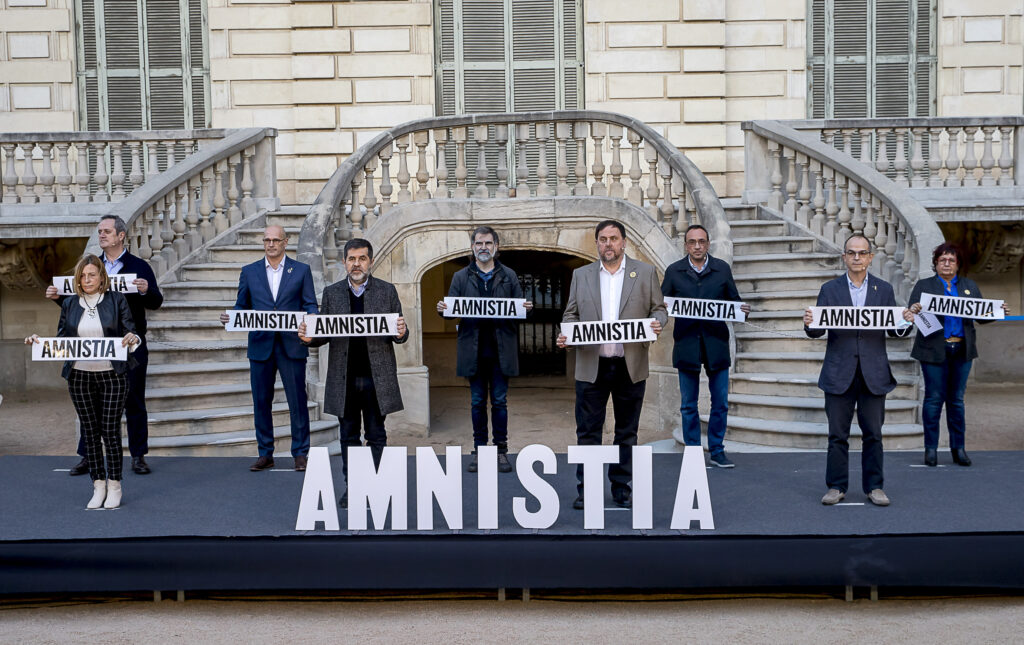26.05.2021 - 18:58
|
Actualització: 26.05.2021 - 20:58
The Spanish Supreme Court opposes granting pardons to the Catalan political prisoners who are in jail for their roles in the 2017 independence referendum. In October 2019, nine pro-independence politicians and activists were sentenced to prison terms of between 9-13 years for sedition owing to their parts in the 2017 push to establish a new Catalan republic.
Stemming from a 1870 law, it is ultimately down to the Spanish government to decide whether to accept each pardon. The administration previously said they were waiting for the non-binding report from the Supreme Court to make their decision, which has come today. Several individuals have requested a pardon for the political prisoners in the past year, including lawyer Francesc Jufresa on December 2019, who made a petition for the 12 convicted officials, nine of whom are serving jail time. The political prisoners themselves never asked for the pardon, as they consider that they deserve amnesty.
The Supreme Court considers that there are no reasons based on “justice, fairness or public utility” to grant the jailed independence leaders pardons. Magistrates consider the prison sentences of 9-13 years imposed to be proportionate and emphasise that there is “no evidence of remorse.” The report, which was presented by the president of the Supreme Court’s criminal chamber, Manuel Marchena, states that the reasons for asking for a pardon lose justification “when those who have been the perpetrators of a mobilization aimed at presenting themselves as political prisoners to unilaterally subvert the constitutional order.”
Decision based on ‘concord’
Spanish president Pedro Sánchez announced on Tuesday that he will make the decision regarding pardons in accordance with the constitutional values of “concord, dialogue and understanding,” while rejecting “revenge.” The Socialist leader said he wanted to overcome “a crisis that cracks Catalan society” and return to “coexistence,” while he reproached the right-wing People’s Party (PP) for creating a political battle on the issue.
Sánchez said that he supported dissolving Catalan sovereignty in the aftermath of the 2017 independence push and imposing direct rule from Madrid “to defend the territorial integrity of the country and because I understood that it was a matter of state,” he recalled. “I wish I had the loyalty that Mariano Rajoy (former PP Spanish president) received from the Socialist party.”
On Wednesday morning in Congress, the Spanish president said that “the Constitution establishes that there is a time for punishment and a time for agreement.” The Socialists’ coalition partners in the Spanish government, anti-austerity Podemos, are far clearer about their stance regarding the pardons, with the party’s president in Congress Jaume Asens calling them “an essential first step” in resolving the conflict.
Right-wing opposition
The Socialist’s comments on Wednesday morning were in response to the leader of the opposition, Pablo Casado, who accused the president of having “lied” to the Spanish people to win the elections and of having “betrayed his word, the code of ethics of the Socialist party.” Right-wing parties in Spain interpret that Sánchez’s words mean that the Socialist government will inevitably grant pardons to the nine jailed Catalan pro-independence leaders. As such, they are already preparing political battles with Sánchez over the matter.
The PP leader devoted his entire question to the issue of the pardons, which he pointed out will become the spearhead of the opposition. Casado portrayed Sánchez as a hostage of the pro-independence forces and insisted – although it is not stated in the law – that in order to be able to grant pardons, the beneficiaries must first “repent” their actions and “commit not to re-offend.” According to Casado, Sánchez intends to “solve a personal problem by transforming it into a state-wide problem” and “prefers to jeopardize the continuity of constitutional Spain in exchange for remaining in power.”
“He wants to pardon those who have attacked the law, broken the concord, and blew up coexistence,” Casado said. According to the leader of the PP, Sánchez “is president of Spain thanks to those who want to end Spain,” referring to the agreement between the Socialists and pro-independence ERC which facilitated Sánchez being named president.
Far-right Vox is equally opposed to the Spanish government potentially pardoning Catalonia’s jailed independence leaders, threatening to “mobilize the population” if this were to happen. “We will exert as much pressure as we can on the street and we will directly oppose pardons,” the party’s spokesperson in Congress, Iván Espinosa de los Monteros, said.
A middle-ground solution
The deliberation process is meant to take up to one year, but it has already moved well beyond that, and with more steps still to come. A pardon may be viewed as a middle-ground solution that makes neither side happy.
“We will clearly not oppose any measure that could alleviate the pain of prisoners, their families, and society,” Catalonia’s new president, Pere Aragonès, said on Wednesday, before stressing that an amnesty would be what most Catalans want.
While pro-independence parties demand an amnesty law that nullifies the Supreme Court verdict that sentenced their leaders for sedition, Spain’s right-wing parties threaten the Socialist-led coalition government with legal action for what they see as a concession to the “enemies of Spain.”


